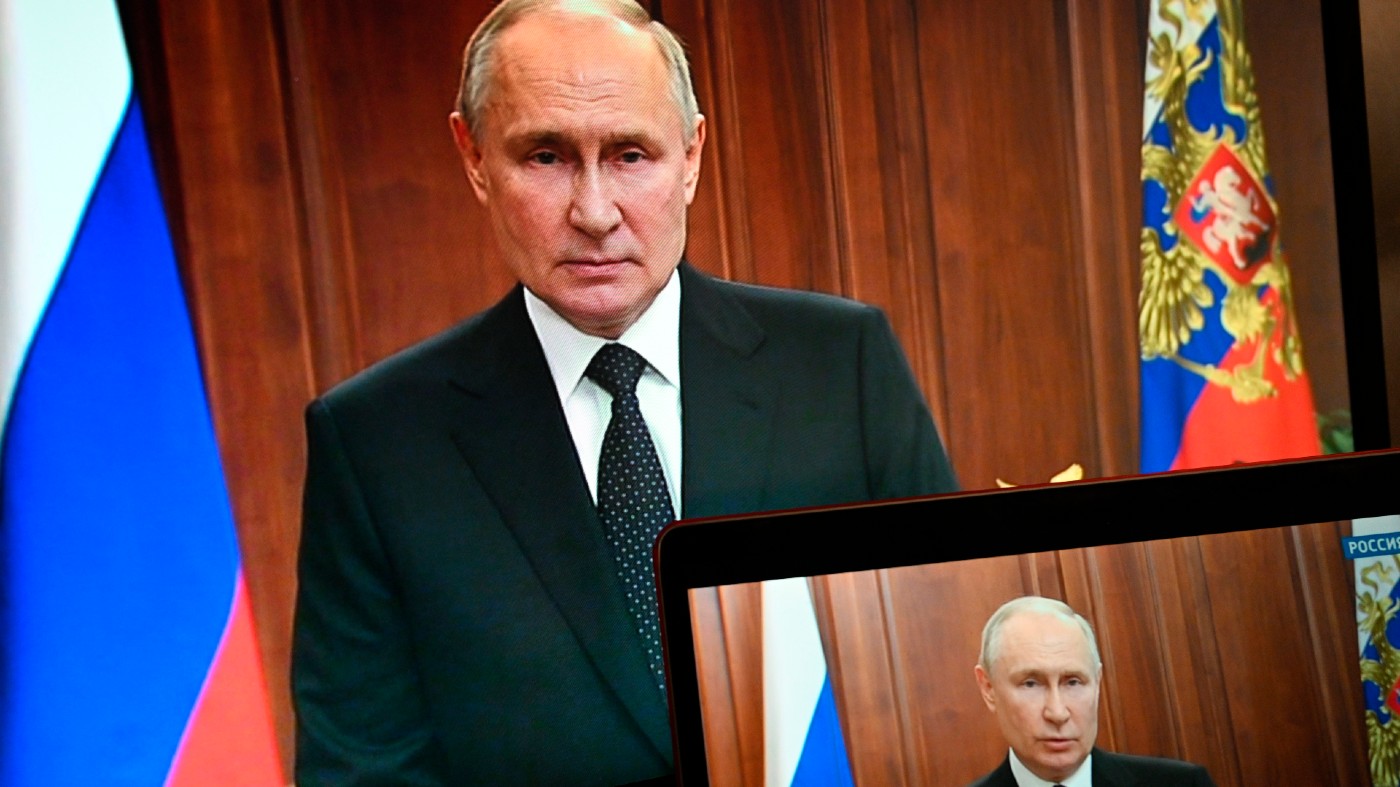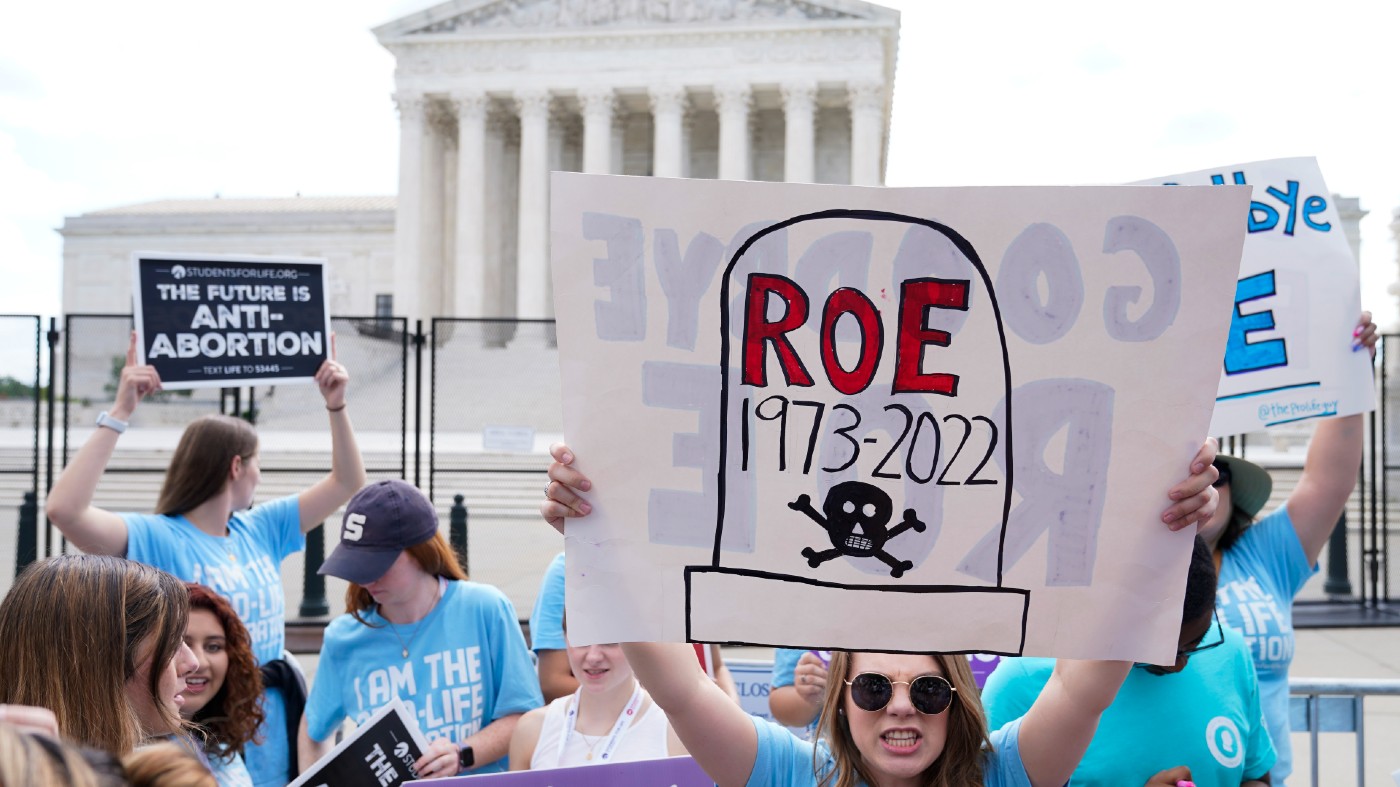The Hill’s Morning Report — Russia in turmoil; Biden hits fundraising circuit
Editor’s note: The Hill’s Morning Report is our daily newsletter that dives deep into Washington’s agenda. To subscribe, click here or fill out the box below.
It’s all about the money in the home stretch of the first fundraising quarter for the 2024 presidential election. President Biden is using this week to kickstart a White House tour to tout federal infrastructure and other investments rolling out to states and communities, and speak at big-ticket fundraisers along the way.
Congress, meanwhile, is in recess until after the Fourth of July, leaving the president with a window of opportunity for messaging before the holiday weekend festivities overtake the public’s attention.
Easier said than done, as the weekend’s near-coup in Russia may throw a wrench in those plans. While the administration’s response to the whiplash-inducing 48 hours has been subdued, U.S. officials will be monitoring and responding to the situation in the coming days and months as new details emerge of the Wagner Group’s now-stalled advance on Moscow and what it means for Ukraine’s chances in the war.
In a series of weekend phone calls with allied leaders, Biden emphasized the importance of not lending any credibility to expected claims from Russian President Vladimir Putin of western interference. The objective, sources told CNN, was to keep the temperature low and allow whatever was happening on the ground in Russia to play out.
Biden spoke with the leaders of the U.K., France and Germany on Saturday, and held calls with the Canadian prime minister as well as Ukrainian President Volodymyr Zelensky Sunday. Zelensky said the call was “positive and inspiring,” and that “the world must put pressure on Russia until international order is restored” (The Hill).
While Wagner Group boss Yevgeny Prigozhin has since left Russia for Belarus under an agreement brokered by President Aleksandr Lukashenko, U.S. officials are still parsing what his rebellion against the Kremlin — and his force’s brief takeover the command center of Russia’s war in Ukraine in Rostov-on-Don — mean for Ukraine’s mounting counteroffensive (Politico).
“It’s too soon to tell exactly where this is going to go. And I suspect that this is a moving picture, and we haven’t seen the last act yet,” Secretary of State Antony Blinken said on CNN Sunday. “But we can say this: First of all, what we’ve seen is extraordinary. And I think you’ve seen cracks emerge that weren’t there before.”
The coming days will show how much Biden — who, alongside Vice President Harris, is kicking off his administration’s three-week infrastructure tour this morning with an announcement to expand high-speed internet access across the country — is able to focus voters and donors on domestic policy, or whether events in Russia will pull his attention across the globe (The Hill).
Biden will travel to Chevy Chase, Md., Tuesday to attend fundraising events, and head to Chicago Wednesday for a fundraiser hosted by Illinois Gov. J.B. Pritzker (D), who is expected to endorse Biden in the 2024 election (Chicago Sun-Times). On Thursday, a day before the Federal Election Commission’s fundraising quarter ends, he’ll be in New York rounding out his campaign’s June fundraising blitz.
▪ NBC News: After a pause, Biden and Harris accelerate campaign cash dash.
▪ NPR: Meet Mitch Landrieu, the man Biden hopes can rebuild America and bring broadband to millions.
Related Articles
▪ The Hill: Republican presidential candidate Will Hurd said Sunday the U.S. should’ve been planning with allies and Ukraine to take advantage of the internal chaos in Russia.
▪ WSPA: Former President Trump will hold a campaign event in Pickens, S.C. on Saturday.
▪ CNN analysis: Biden vs. Trump: The 2024 race a historic number of Americans don’t want.
LEADING THE DAY
➤ RUSSIA
© The Associated Press / Pavel Bednyakov, Sputnik, Kremlin Pool | Russian President Vladimir Putin speaks after Wagner Group leader Yevgeny Prigozhin called for armed rebellion Saturday.
The Wagner coup was over almost as quickly as it had begun, but Putin’s power appeared to hang in the balance over the weekend for the first time in his more than 20-year rule. Though the mercenaries who descended on Moscow turned back, Putin’s image of a man in total control has been shaken — which could set the stage for further challenges to his rule at home and could weaken Russia’s hand in the war in Ukraine.
For two tense days, Prigozhin’s troops swept into Rostov-on-Don and seized the military headquarters there with a stated aim of ousting Russia’s defense minister, Sergei Shoigu, after alleging that he ordered a strike on Wagner’s field camps in Ukraine. They then continued hundreds of miles north on a march toward the capital without meeting any serious resistance. Some were even cheered (The Associated Press and Reuters).
The open rebellion vividly displayed the weakness of Russia’s military at a crucial time for Ukraine as it mounts its counteroffensive against the Kremlin. As Politico reports, the general agreement during calls between the U.S. and its European allies is that Kyiv now has an unprecedented opportunity to advance while a key mercenary force shifts its attention from holding Ukrainian positions to attacking points inside Russia.
“There are certainly more questions than we have answers to, at least right now. I think we’ll get to the bottom of some of these but it will take months, if not years,” Steve Hall, a former CIA chief of Russia Operations, told CNN. “We know for sure now that Vladimir Putin personally, and as the leader of Russia and Russia writ large, is in a much weaker position than they were 36 hours ago. This is, of course, a great benefit to the Ukrainians. But I think Putin has to be diminished. There’s no way he can be looked at again as a monolithic leader who controls everything inside of Russia. That’s simply not the case anymore and it’s obvious to everybody in the world.”
▪ NPR: After its march toward Moscow, what’s next for Russia’s Wagner Group?
▪ Politico: “The people are silent”: The main reason the Wagner mutiny bodes ill for Putin.
▪ The New York Times: Though the Wagner rebellion ended quickly, it raised questions in Russia about the power of the state.
▪ The Washington Post: Uneasy calm returns to Russia in wake of armed revolt by the Wagner Group.
▪ The Wall Street Journal: After a weekend of chaos in Russia, questions remain over the fate of the Wagner Group. With both Putin and Prigozhin silent, Russians and Western officials wonder whether the crisis is truly over.
➤ POLITICS
© The Associated Press / Jacquelyn Martin | Demonstrators outside the Supreme Court on Saturday.
Since the Supreme Court overturned Roe v. Wade, anti-abortion activists have searched for new issues and arguments to keep supporters energized at a time when pro-abortion rights activists are politically mobilized to challenge state abortion restrictions, campaign to elect more Democrats to Congress, fight to keep the White House in Democratic hands and publicly challenge the ethics of and influence over some conservative justices, reports The Hill’s Brett Samuels.
MSNBC: Former Speaker Nancy Pelosi (D-Calif.) for the first time said about Supreme Court justices, “There certainly should be term limits.”
Because of the Supreme Court’s ruling last year, public opinion about abortion rights has shifted, suggesting continued political repercussions, The New York Times reports. For the first time, a majority of Americans say abortion is “morally acceptable.” Most now believe abortion laws are too strict. They are significantly more likely to identify, in the language of polls, as “pro-choice” over “pro-life” for the first time in two decades.
Trump was a New York Democrat and an independent before becoming a Republican and has held evolving positions on abortion. He told conservative supporters on Saturday that he backs their agenda. He claimed responsibility for overturning Roe v. Wade because of his three Supreme Court nominations, resulting in the current conservative majority (The New York Times).
“No president has ever fought for Christians as hard as I have,” he told the audience at a Faith and Freedom Coalition event in Washington, adding, “I got it done, and nobody thought it was even a possibility.”
Former Vice President Mike Pence, a 2024 presidential candidate and religious conservative, over the weekend challenged GOP primary rivals and said tough abortion restrictions are a “winning issue” for the Republican Party (The Hill).
“I did this week call on every other candidate for the Republican nomination to support a minimum standard of a 15-week ban on abortion at the national level,” Pence told “Fox News Sunday” during an interview.
The Hill: How the Supreme Court’s Dobbs decision stunted anti-abortion action by House Republicans.
Republican presidential candidates seeking lift are looking ahead at the first debate in less than two months, to be held Aug. 23 in Milwaukee.
The rules adopted by the Republican National Committee will keep some candidates off the stage based on their donation totals, polling thresholds in national surveys in key states and a controversial requirement that candidates pledge in writing to support the eventual GOP nominee. Two candidates — former New Jersey Gov. Chris Christie and former Arkansas Gov. Asa Hutchinson — have asked the party to waive that requirement in light of Trump’s recent federal indictment, which they argue made the former president unfit to be the party’s nominee.
Politico: Guide to the first GOP debate.
Trump, competing in an increasingly sprawling primary field that, based on size, could benefit his candidacy as the de facto leader, is keeping Republicans guessing about his participation in the first GOP debate, reports The Hill’s Julia Manchester.
On the Democratic side of the presidential contest, Biden’s allies brush off calls for debates, reports The Hill’s Hanna Trudo. Democratic challengers Robert F. Kennedy Jr. and Marianne Williamson are eager to get on a stage with Biden. Third-party candidate Cornel West told The Hill he would “welcome” the chance to go head-to-head with the president.
2024 roundup: Trump’s campaign gets 90 percent of donations it receives and funnels 10 percent of contributions to a super PAC to help pay his legal fees (The New York Times). … Trump expanded his lead over the GOP primary field following his federal charges in the classified documents case, according to an NBC News poll (The Hill). … Florida Gov. Ron DeSantis is trailing Trump in GOP presidential primary polls but has not hit Trump head-on while campaigning (The Hill). … Arizona Gov. Katie Hobbs (D) stripped county prosecutors of authority to pursue abortion cases, arguing she won’t allow “extreme” politicians to impede “fundamental” rights of people in her state (NBC News). … Abortion pills will remain legal in Wyoming for now, after Teton County Judge Melissa Owens ruled last week that the state’s first-in-the-nation law to ban them won’t take effect July 1 as planned while a lawsuit proceeds (Politico). … Kansas GOP Attorney General Kris Kobach is moving to block transgender people from changing their birth certificates (The Associated Press).
IN FOCUS/SHARP TAKES
➤ SUPREME COURT
It will be a big week for the high court as it issues rulings at the end of a tumultuous term (The Associated Press).
With 10 cases pending, the Supreme Court is set to hand down opinions on student debt relief, affirmative action and federal election laws. The next batch is expected Tuesday morning and The Hill’s Zach Schonfeld explains the cases that remain on the docket.
▪ The Hill: GOP senators want Chief Justice John Roberts to take action on the Supreme Court.
▪ NBC News: A decision on affirmative action is expected to dominate the court’s term.
Last week’s Supreme Court decision stating that the U.S. does not have to secure water for the Navajo Nation denies help to a community that struggles with water access, experts and advocates say. As the Hill’s Rachel Frazin reports, the high court ruled Thursday that the U.S. does not have to take “affirmative steps” to secure water for the tribe under an 1868 peace treaty. The Navajo Nation’s Department of Water Resources says that about 30 percent of the population does not have access to clean, reliable drinking water, and the U.S. Environmental Protection Agency’s website says that about 15 percent don’t have access to piped water at their homes.
“[The ruling] makes it harder for us to secure our water rights,” Navajo Nation President Buu Nygren told The Hill. “It doesn’t say that we’re not going to get any. … [It just] puts up barriers for us.”
© The Associated Press / Ross D. Franklin | The Colorado River in the upper River Basin in Arizona in 2021.
OPINION
■ Why I ordered 200 incandescent light bulbs, by Kathleen Parker, columnist, The Washington Post.
■ Putin is caught in his own trap, by Anne Applebaum, staff writer, The Atlantic.
WHERE AND WHEN
📲 Ask The Hill: Share a news query tied to an expert journalist’s insights: The Hill launched something new and (we hope) engaging via text with Editor-in-Chief Bob Cusack. Learn more and sign up HERE.
The House will meet Tuesday at 9 a.m. for a pro forma session; lawmakers return July 11 to the Capitol.
The Senate will convene at 2 p.m. for a pro forma session. Members return to Washington on July 10.
The president and Vice President Harris at 11:45 a.m. in the East Room will announce a new phase of federal infrastructure support for high-speed internet. The president will have lunch with Harris at 12:30 p.m. at the White House. Biden will receive the President’s Daily Brief at 2 p.m.
The vice president, in addition to a White House infrastructure event this morning and lunch with Biden, will fly to New York City for a fundraising event at 7:30 p.m.
Health and Human Services Department Secretary Xavier Becerra will speak about the LGBTQI+ community during “HHS Pride Summit 2023 – Protecting Our Gains” at 9 a.m. at HHS headquarters in Washington.
The White House daily press briefing is scheduled at 2 p.m.
ELSEWHERE
➤ HEALTH
Abortion providers in coastal blue states expect to experience significant investments in reproductive health care in the wake of the Dobbs ruling. While liberal states such as New York and California saw some increases in the number of abortions in the post-Roe year, numbers were eclipsed by Florida, which borders states with tough abortion restrictions (Politico).
Dozens of clinics have closed or halted abortions as a result of state laws. The New York Times set out to see what happened to them and the surrounding communities.
Expected shortages of medical workers in Ohio could pose a threat to patient outcomes (Mansfield Journal).
Plus and minus: To rank states with the best and worst healthcare in America, a new study examined health outcomes and affordability, preventive care and treatment, potentially avoidable hospital use and cost, healthy lives, reproductive care and women’s health, income disparity and racial and ethnic health equity. The list of the best states: Massachusetts, Hawaii, New Hampshire, Rhode Island and Vermont. The list of the worst states, according to the Commonwealth Fund: Mississippi, Oklahoma, West Virginia, Texas and Arkansas (Yahoo Finance).
COVID-19 isn’t over, but even the most cautious Americans are moving on, reports The Washington Post. Maybe so, but the next COVID-19 booster is likely to be available by September for those people who want to tune up their immunity to the latest coronavirus variant. The Food and Drug Administration wants drug makers to focus on the XBB coronavirus strain (the XBB.1.5 variant is the most prevalent) (NBC News).
THE CLOSER
© The Associated Press / Frank Augstein | Francis Bacon’s “Portrait of George Dyer” in London in 2017.
And finally … Art is in the eye of the beholder, yet there seems to be general consensus that the high-end art market is getting more creative.
A company called Artex is launching a roughly $55 million initial public offering of artist Francis Bacon’s “Three Studies for a Portrait of George Dyer,” with trading expected to begin next month.
Shares in the portrait painted in 1963 will be sold for around $100 a piece and will list on a specially created art stock exchange based in Liechtenstein, giving smaller investors the ability to buy and sell shares in a famous artwork on a stock exchange for the first time, The Wall Street Journal reports.
The advent of publicly listed artwork raises the possibility of a “takeover” of the Bacon portrait. If a billionaire collector or museum wants to swoop in with a bid, they must offer a 20 percent premium to the average closing price of the shares over the previous 20 trading days, according to rules set by Artex. A rival bidder can then step in and offer even more, though unlike with a typical corporate takeover, shareholders don’t get to vote on whether to accept the offer.
Like gold, high-end art has a solid reputation as an inflation hedge, the Journal reports. Between 1974 and 1980, a pension fund for British Rail bought a collection of paintings as protection against spiraling prices in the U.K. economy. It made a real return of just under 6 percent a year after holding the works for around two decades.
Stay Engaged
We want to hear from you! Email: Alexis Simendinger and Kristina Karisch. Follow us on Twitter (@asimendinger and @kristinakarisch) and suggest this newsletter to friends!
Copyright 2023 Nexstar Media Inc. All rights reserved. This material may not be published, broadcast, rewritten, or redistributed.





